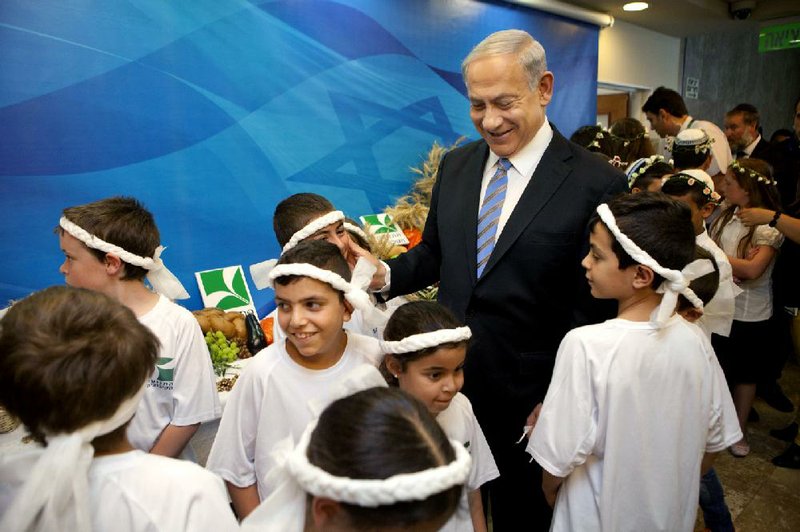JERUSALEM -- Israel's prime minister on Sunday urged the world to shun the emerging Palestinian unity government because of its ties to the Hamas militant group, rejecting Palestinian pledges that it will be a government of technocrats that will accept peace agreements with Israel and eschew violence.
The comments by Benjamin Netanyahu set the stage for what is likely to be a tough battle for international opinion in the coming weeks. While Israel has made clear it will reject the new government, the reactions of the European Union and United States -- which send the Palestinians hundreds of millions of dollars in aid each year -- will be critical in determining whether it can survive and whether Israel will be forced to deal with it.
Addressing his Cabinet on Sunday, Netanyahu said the Palestinian government will "strengthen terrorism."
"Hamas is a terrorist organization that calls for the destruction of Israel, and the international community must not embrace it," he said.
Palestinian President Mahmoud Abbas said over the weekend that he will present the new government today, a move meant to end a seven-year rift between his Fatah movement and Hamas.
Ehab Bessaiso, a spokesman for the Palestinian government, said Sunday, "We are expecting some hard times to come in the next few weeks."
The Palestinians have been divided between two governments since Hamas took control of the Gaza Strip from Abbas' forces in 2007, leaving the president in charge only of autonomous areas of the West Bank.
The rift is unpopular among Palestinians and presents an obstacle to establishing a Palestinian state. The Palestinians seek the West Bank and Gaza, along with Israeli-annexed east Jerusalem, for their state. Israel captured the three areas in the 1967 Mideast War.
Repeated attempts at reconciliation have failed in the past, and officials reported last-minute haggling Sunday. Khalil al-Haya, a top Hamas official in Gaza, said a disagreement over the Palestinian ministry for prisoners held by Israel threatened to delay today's announcement.
But both Palestinian factions now have incentives to repair ties.
Hamas is in the midst of a financial crisis because of a blockade imposed by Israel and Egypt, while Abbas is in need of an accomplishment after the collapse of peace talks with Israel in late April. Convinced that he cannot reach peace with Netanyahu, the Palestinian leader believes now is the time to get internal Palestinian affairs in order.
To rally international support, Abbas has pledged that the new government will consist of apolitical technocrats and will accept international demands to renounce violence and recognize Israel's right to exist. The government is to be headed by Abbas' prime minister, Rami Hamdallah, a British-educated university president.
A statement from Hamdallah's office Sunday denounced Netanyahu's call, saying it was part of a campaign intended to "cement the occupation by all means."
Since the Palestinian factions announced their intentions to reconcile in late April, Netanyahu repeatedly has condemned the plan, saying that even tacit backing from Hamas would make it impossible to deal with the new government.
Israel and the West consider Hamas, which is sworn to achieve Israel's destruction and has killed hundreds of Israelis in suicide bombings and other attacks, a terrorist group. Even after the unity deal, Hamas will keep control over a significant arsenal and thousands of fighters in Gaza.
Hamas officials said Sunday that the ministers who had formed a shadow government in Gaza would immediately return to their posts within the political party or as university professors; Ismail Haniya, the Hamas prime minister, will be known simply as "deputy leader" of the movement.
The fate of more than 100,000 public-sector workers, generally two for every job, remains unclear. Similarly, uncertainty exists concerning the duplicate services, such as the two checkpoints -- one run by Hamas and one by the Palestinian Authority -- at the Erez crossing into Israel.
"When the new government is declared, the current government in Gaza will submit its resignation," said Yousef Rizky, Haniya's political adviser. "Restoring administrative unity is one of the transnational government's tasks."
Abbas said Israel has already threatened punitive measures in response.
In the past, Israel has applied financial pressure by withholding tens of millions of dollars in tax revenue it collects on behalf of the Palestinians each month.
And during a short-lived Palestinian unity government in 2006 and 2007, the West withheld international aid to the Palestinians because of Hamas' participation.
But it is not clear whether the international community will back his tough stance this time around. The U.S. and European Union have signaled that they are willing to at least give the new Palestinian government a chance. The U.S. and EU are the largest donors to the Palestinians, providing hundreds of millions of dollars in aid to Abbas' government each year.
Last month, the EU said it "looks forward to continuing its support" to the Palestinians if the new government commits to nonviolence and seeking peace with Israel.
The U.S. has said it will not make any decision until it sees the makeup of the government and sees its formal program.
Information for this article was contributed by Josef Federman, Daniel Estrin and Mohammed Daraghmeh of The Associated Press and by Jodi Rudoren and Isabel Kershner of The New York Times.
A Section on 06/02/2014

